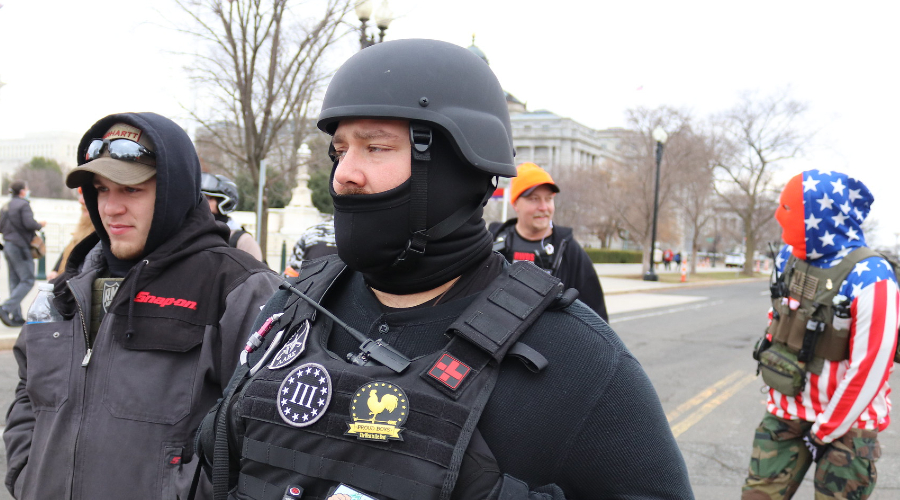Cutting Off Financing for the Next Capitol Insurrection
Far-right extremists have done little to disguise how they crowdfund their activities and legal defenses.

Published by The Lawfare Institute
in Cooperation With

Editor’s Note: Political violence is often expensive: Beyond the cost of weapons, people need to travel, find places to stay, and make up for lost time at their jobs, among many other costs. Jessica Davis and Elena Martynova of Insight Threat Intelligence examine the Jan. 6 insurrection, looking at the myriad ways the participants financed themselves, and call for an array of actors to step up their efforts to stop such financing.
Daniel Byman
***
The attack at the Capitol building on Jan. 6, 2021, wasn’t cheap. The insurrectionists spent considerable sums to travel to Washington, D.C., purchase weapons and gear, hold events, and, afterward, pay their legal fees. The rally at the Ellipse that immediately preceded the riot at the Capitol cost roughly $500,000, including fees for a concert stage, $100,000 for grass covering, and security structures. The main groups involved in the insurrection continue to operate in the United States and use their funds to stage more events, pay legal fees arising from the riot (and new issues), and support organizational goals—including continued recruitment. While large individual donors are an important source of funds, access to even relatively small amounts of money, often through crowdfunding platforms, allowed plenty of insurrectionists to travel and participate in the attack on the Capitol. As a result, the Jan. 6 attack should not be viewed as a low-cost attack. Instead, the costs were distributed across many participants and donors, all of whom conspired to create a massively disruptive event and attempt to overthrow a democratically elected government—financing that activity with personal, institutional, and organizational funds.
Using a combination of open-source materials, news reporting, and some primary documents, this analysis draws together disparate information about how the individuals, influencers, political operatives, and extremist groups and movements financed their activities leading up to, on, and after Jan 6. These sources show that the methods used by the Jan. 6 insurrectionists to organize and finance their activities are similar to those from the broader violent right-wing ecosystem. Understanding how these finance networks function could be used to prevent or disrupt their access to funding in the future.
The Jan. 6 insurrectionists raised money through a variety of different methods but primarily through a combination of individual donors, formal and informal crowdfunding campaigns, and self-funding of travel and related expenses. One of the individual donors to the events surrounding Jan. 6 was Alex Jones, who pledged over $100,000 for various events. Jones also arranged for other donors to fund the roughly $500,000 in costs for the Ellipse rally.
The three main groups involved in the insurrection at the U.S. Capitol—the Oath Keepers, the Proud Boys, and the Three Percenters—mobilized their own funding channels to support their actions. These groups used a combination of strategies to finance their activities, but all three have used crowdfunding to bring in money. While in some cases these groups use formal crowdfunding platforms like GoFundMe and GiveSendGo, they also tend to use “informal” or peer-to-peer crowdfunding strategies, soliciting donations directly or through websites owned and controlled by group members. Some chapters of the Proud Boys and Oath Keepers continue to use crowdfunding to cover legal fees. These groups also operate fundraising sites, often selling merchandise and in some cases accepting “charitable” donations.
Individual attendees who did not have access to these resources relied on other strategies, but they also raised funds to attend the event through both formal (platform-based) and informal (usually livestream or text message) crowdfunding campaigns. Some private websites were also set up by attendees and political operatives to solicit funds, which allowed them to circumvent formal crowdfunding platforms, gave them greater control over raised funds, and made them more difficult to deplatform.
Many of the websites set up by organizations and individual attendees used payment processors, including PayPal and Stripe, to receive donations. For instance, payments on a now-defunct Proud Boys website were processed through Square, Chase, and PayPal, allowing them to receive money from 13 different credit cards, as well as bitcoin and other cryptocurrency payments through CoinPayments (a federally registered company in Canada).
Some of the groups implicated in the Jan. 6 attack also established charitable or not-for-profit entities to raise funds both before and after the events of Jan. 6. For example, the Three Percenters have raised funds through “charitable” organizations such as the American Defence Force and the American Border Foundation, the latter of which was a registered 501(c)(3) tax-exempt organization in the United States until Nov. 15, 2021. The Oath Keepers have also established local chapters as tax-exempt organizations. While most of the funds raised through these organizations were probably not used for the Jan. 6 insurrection, the use of these corporate structures for the groups’ chapters helps them avoid paying taxes and their federal registration creates a veneer of legitimacy. This practice has also been replicated in Canada, where individuals who advocated for the overthrow of the Canadian government and occupied Ottawa have created a series of not-for-profit corporations.
While it is common for extremist groups to hide the source and destination of their funds, such as through hiding the names of donors or recipients, these three key groups have made little effort at financial tradecraft. Instead, because they operate within the United States with relative impunity, they have had little need to make any serious efforts to hide their financial activities. While some of these groups’ activities are being curtailed by law enforcement and administrative procedures (such as through arrests relating to Jan. 6 and the closure of tax-exempt organizations), for the most part, these groups continue to operate publicly and openly, with members seeking and holding public office.
To prevent the financing of future insurrections and violent far-right extremism, a number of issues should be addressed both globally and in the United States. In facing violent far-right extremism, governments should reexamine their policies around tax-exempt institutions and ensure that organizations that qualify for tax-exempt status operate for the public benefit and are not a cover for extremist activity. This will help to ensure that organizations like those established by the Oath Keepers and the Three Percenters to raise funds receive more scrutiny and are ultimately shut down. Payment processors should also be brought more fully into existing anti-money laundering and counterterrorist financing regimes to prevent their being used by extremist groups to facilitate payments and transfer funds. In many cases, these financial facilitators are exempt from anti-money laundering reporting requirements, a gap in the regime that extremists are currently exploiting. All companies, including payment processors, website hosts, crowdfunding platforms, and financial institutions, should carefully consider the reputational risks of providing financial services to violent extremist groups and review (and implement) their terms of service to prevent this.
U.S. policy should also respond to the international dimensions of the funding of these groups. The United States should consider, at the very least, designating the foreign-based affiliates or supporters of U.S. extremist groups, such as the Canadian Proud Boys and the Canadian Three Percenters. It should also work with other governments—such as Canada, the United Kingdom, and New Zealand—to ensure that they also enforce their terrorist designations and prevent companies domiciled in their jurisdictions from providing financial services to listed terrorist entities. Partner countries should consider listing the Proud Boys, Oath Keepers, and Three Percenters as terrorist groups under their domestic legislation to better coordinate with actions already taken by Canada, New Zealand, and other countries working to counter violent, far-right extremism and prevent their jurisdictions from being exploited by U.S.-based groups that could seek financial safe haven or fundraising opportunities outside of the United States. These designations have important operational, support, and signaling effects for countering extremist violence. Designating these groups as terrorist entities would criminalize their financing and the provision of financial support, making it far more difficult for them to operate, organize, and plan future attacks.
Although there are no easy solutions to prevent the financing of similar movements, events, or attacks, a coordinated, international response that criminalizes extremist violence and efforts to overthrow democratically elected governments can help make the democratic process in the United States—and other democratic countries around the world—far more secure.



-(1).jpg?sfvrsn=b91ff6a6_7)

.jpg?sfvrsn=ca10a5c_7)
